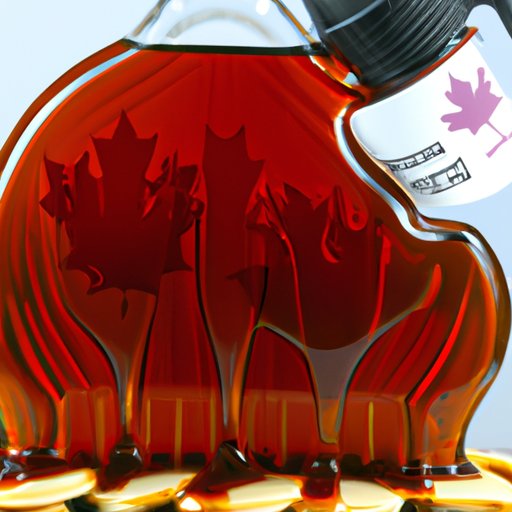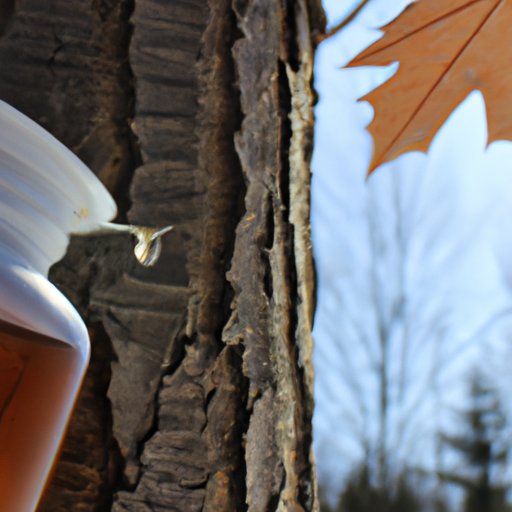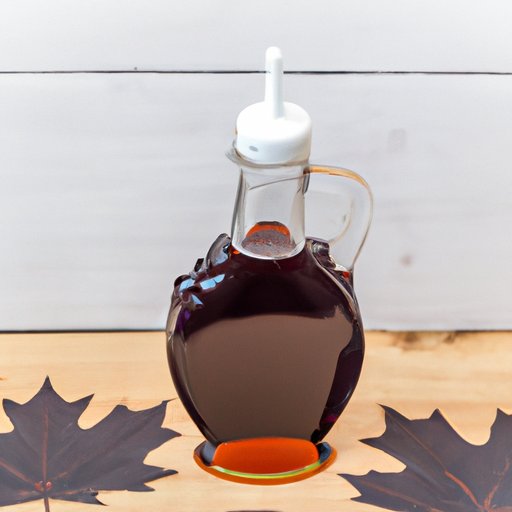Introduction
Maple syrup is a popular natural sweetener made from the sap of maple trees. It has been used as a food source for centuries by Native Americans and Canadians, and it is now enjoyed around the world. But is it healthy? This article will explore the potential health benefits and risks of consuming maple syrup, as well as how it compares to other natural sweeteners.
Analyzing the Nutritional Benefits of Maple Syrup
Maple syrup is composed of sucrose, fructose, and glucose, as well as trace amounts of minerals such as calcium, potassium, and magnesium. It also contains small amounts of vitamins B2, B5, and B6. One tablespoon (15 ml) of maple syrup contains about 52 calories, 12 grams of carbohydrates, and 11 grams of sugar.
In terms of its nutritional profile, maple syrup is higher in some nutrients than other sweeteners. For example, it has more calcium, potassium, and magnesium than honey or agave syrup. However, it is still primarily composed of sugars, so it should be consumed in moderation.
According to Dr. Rachel Berman, a Registered Dietitian and Health Content Manager at About.com, “Maple syrup is a natural sweetener that can be part of a healthy diet when consumed in moderate amounts. In addition to providing sweetness, it adds flavor and moisture to foods.”

Examining the Health Risks of Consuming Too Much Maple Syrup
Although maple syrup is a natural sweetener, it still contains large amounts of sugar, which can have negative health effects if consumed in excess. Here are some of the potential risks associated with consuming too much maple syrup:
Risk of Weight Gain
Since maple syrup is high in calories and sugar, consuming too much of it can lead to weight gain. According to a study published in the journal Obesity Reviews, “High intakes of added sugars, particularly from sugar-sweetened beverages, are associated with an increased risk of obesity.”
Risk of Tooth Decay
The sugar in maple syrup can also contribute to tooth decay. A study published in the journal Caries Research found that “the consumption of sugar-containing foods contributes to the development of caries.”
Risk of Excessive Sugar Intake
Consuming too much sugar can have serious health consequences. According to the World Health Organization (WHO), “There is increasing evidence that free sugars intake, when it replaces nutrient-dense foods, increases the risk of overweight, obesity, and dental caries.”

Exploring the Potential Health Benefits of Maple Syrup
In addition to its potential risks, maple syrup may also provide some health benefits. Here are some of the potential benefits associated with consuming maple syrup:
Source of Antioxidants
Maple syrup is a source of antioxidants, which are compounds that help protect the body from damage caused by free radicals. According to a study published in the journal Food Chemistry, “Maple syrup contains several classes of antioxidants, including phenolic acids, flavonoids, and anthocyanins.”
Potential Role in Disease Prevention
The antioxidants in maple syrup may also play a role in disease prevention. A study published in the journal Nutrients found that “antioxidants may reduce the risk of chronic diseases, such as cardiovascular disease and cancer.”
Comparing Maple Syrup to Other Natural Sweeteners
When comparing maple syrup to other natural sweeteners, it is important to consider the nutritional profile and health benefits of each one. Here is a comparison of the nutritional profiles and potential health benefits of maple syrup, honey, and agave syrup:
Comparison of Nutritional Profiles
Maple syrup is higher in some nutrients than honey and agave syrup. For example, it has more calcium, potassium, and magnesium than either honey or agave syrup. However, all three sweeteners are high in sugar and should be consumed in moderation.
Comparison of Health Benefits & Risks
All three sweeteners have potential health benefits and risks. Maple syrup is a source of antioxidants, which may help prevent chronic diseases. However, like all sweeteners, it is high in sugar and should be consumed in moderation to avoid weight gain and tooth decay.
Investigating the Impact of Maple Syrup on Blood Sugar Levels
In addition to its nutritional profile, it is also important to consider how maple syrup affects blood sugar levels. When consumed in moderation, maple syrup does not cause dramatic spikes in blood sugar. According to a study published in the journal Nutrition Research, “Maple syrup had a lower glycemic index than white sugar, indicating that it may be a better option for those looking to maintain stable blood sugar levels.”
However, it is important to note that the glycemic index of maple syrup varies depending on the type of syrup and how it is processed. For example, pure maple syrup has a lower glycemic index than processed syrups, which means it is less likely to cause spikes in blood sugar levels.
Conclusion
In conclusion, maple syrup is a natural sweetener that can be part of a healthy diet when consumed in moderation. It is higher in some nutrients than other sweeteners, and it may also provide some health benefits due to its antioxidant content. However, it is still high in sugar and should be consumed in moderation to avoid weight gain and tooth decay. Finally, the glycemic index of maple syrup varies depending on the type of syrup and how it is processed, but pure maple syrup has a lower glycemic index than processed syrups, making it a better option for those looking to maintain stable blood sugar levels.
Summary of Findings
In summary, maple syrup is a natural sweetener that can be part of a healthy diet when consumed in moderation. It is higher in some nutrients than other sweeteners, and it may also provide some health benefits due to its antioxidant content. However, it is still high in sugar and should be consumed in moderation to avoid weight gain and tooth decay. Finally, the glycemic index of maple syrup varies, but pure maple syrup has a lower glycemic index than processed syrups, making it a better option for those looking to maintain stable blood sugar levels.

Recommendations for Healthier Maple Syrup Consumption
To get the most health benefits from maple syrup, it is important to consume it in moderation. Try using it as a sweetener for oatmeal, yogurt, or smoothies, or as a topping for pancakes or waffles. You can also use it to add flavor to marinades or glazes for meat or vegetables. By making small changes to your diet, you can enjoy the taste of maple syrup while reducing your risk of weight gain and tooth decay.
(Note: Is this article not meeting your expectations? Do you have knowledge or insights to share? Unlock new opportunities and expand your reach by joining our authors team. Click Registration to join us and share your expertise with our readers.)
